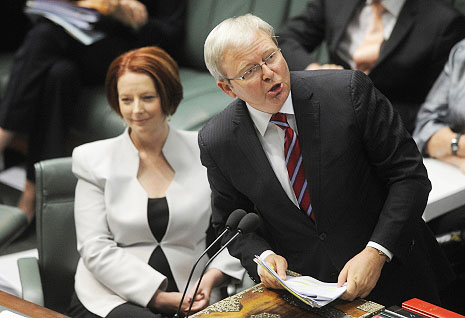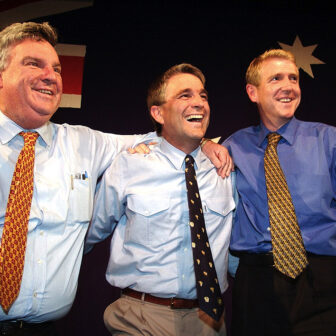VERY few of our prime ministers, once departed the Lodge, return. Macbeth-like, they strut and fret their hour upon the stage and are gone; if they are heard at all, it is from the sidelines, beyond the arena of battle. Of the twenty-seven to date, only three have returned to the office after leaving it – the early prime ministers Alfred Deakin and Andrew Fisher, who each served on three occasions, and Robert Menzies, deposed after two years by his own followers in 1941, but returning in 1949 with a new party and staying put for a record sixteen years.
Apart from the accidental and caretaker leaders, only Joseph Cook, Stanley Melbourne Bruce, Billy Hughes, Robert Menzies, John Gorton and Kevin Rudd have stayed on to serve in lesser portfolios; another, James Scullin, declined all offers of a job and remained in parliament as a backbencher for almost eighteen years after losing office in 1932. Among this group, Bruce, Hughes, Menzies (and possibly Rudd) all planned, plotted and hoped for a return to the top job – but only Menzies succeeded.
A former leader still in parliament has the capacity either to make trouble or to be a focal point for others intent on mischief, and for this reason Malcolm Fraser refused to have the man he deposed, Bill Snedden, in his ministry after his win in 1975, despite Snedden’s long ministerial experience. He was effectively sidelined in the speakership. Fraser had seen first-hand how a deposed leader, wounded and resentful, could seek to settle scores, as John Gorton did during his brief stint at defence under Billy McMahon.
In recent times, all but one defeated prime minister have departed quickly. Malcolm Fraser resigned his seat after losing the 1983 election; Bob Hawke did the same after he was deposed by Paul Keating in 1991. Keating quit parliament after losing the 1996 election; the voters of Bennelong saved John Howard the trouble of resigning in 2007. Kevin Rudd broke the pattern, hanging on after ambush and defeat in his first term.
The speculation about a Rudd comeback – speculation that is destabilising the government, and has the potential to paralyse it – is the unsurprising product of two lapses of judgement within the Labor Party. The first was the party’s reluctance to tap Rudd on the shoulder before the 2010 election and tell him that he’d had his turn and it was time to leave parliament, and the second was Julia Gillard’s foolish promise to hand Rudd a senior cabinet post. It was well-known that Rudd had more than a vindictive streak and, even worse (and as many people knew), he had ruthlessly undermined the man he had succeeded, the respected Kim Beazley.
The big question surrounding a possible Rudd return is whether Rudd Mk II would be any different from Rudd Mk I, and if so, how. The closest we have to any sort of precedent is that of Menzies, never one to reflect on his own shortcomings, who offered a muted mea culpa of sorts on his first prime ministership, frankly admitting that his “knowledge of people, and how to get along with them and persuade them” had “lagged behind.” As he wrote in his memoir, Afternoon Light: “I was still in that state of mind in which to be logical is to be right, and to be right is its own justification. I had yet to acquire the common touch, to learn that human beings are delightfully illogical but mostly honest, and to realise that all-black and all-white are not the only hues in the spectrum.” Can we imagine such words issuing from the lips of Kevin 07?
The problem with Rudd’s removal – and one that has continued to dog Gillard, who has never tried to construct a persuasive narrative about it – is that beyond the inner confines of the Canberra political hothouse, few people really understood, then and now, just how toxic the working environment had become. Fellow cabinet ministers, staffers, advisers, senior and sometimes junior public servants (and a hapless RAAF cabin attendant) all bore the brunt of Rudd’s tantrums and capacity to irritate and bully.
The last prime minister to get so many people offside, most of them his own supporters, was Malcolm Fraser. Like Rudd, Fraser worked hard himself and drove others to work hard, yet he was cool, detached and impersonal with those around him, too often shunning what Paul Kelly called “the intimate human dialogue that creates personal understanding.” His style was seen by many as bullying, and many of his ministers believed that he did not trust their judgement by allowing them independence; a consequence of this was that they were disinclined to act independently or show initiative. And while many political colleagues respected him, and were even in awe of him, they did not like him. In the memorable words attributed to Fred Chaney and delivered to Fraser personally, “You confuse leadership with command.” The similarities with Rudd are many, but there is one important qualitative distinction: Fraser was respected, even by those who disliked him; Rudd is not. With Rudd it’s visceral.
Some two months before the move against Rudd in 2010, I found myself in conversation with two cabinet ministers who had been pushed to the brink. I asked what the problem was with the prime minister and one said: “It’s impossible to know how this man’s mind works. You can’t read him, you can’t reason with him, you can’t even talk to him.” I knew then, and wrote as much, that Rudd was in trouble with his own.
A senior Labor official, who had played a key role in the anti-WorkChoices campaign that secured victory for the ALP in 2007, related how Rudd, when opposition leader, would call him to talk several times a day during the campaign, but when he encountered Rudd in a corridor at Parliament House shortly after Rudd became prime minister, he was left with his hand outstretched but unshaken as the new PM swept by without a word. This story is replicated many times over, and strongly suggests – as Simon Crean has stated publicly – that Rudd is unable to work in a team. What is there to suggest anything has changed?
What Kevin Rudd palpably failed to recognise was that his primary constituency, through whose confidence he held office, was his parliamentary caucus. A returned Rudd would be vindicated with no reason to change anything; indeed, he may well be worse because he will have been told that he is indispensable.
The imperious Menzies added little to his meagre store of humility after his political resurrection, notwithstanding his claim to having acquired a common touch. Bill Snedden, who was appointed attorney-general by Menzies, never forgave the PM for publicly humiliating him once on the floor of the House, upon which he had angrily submitted his resignation. He later withdrew it after unsuccessfully seeking an apology, to which Menzies had replied loftily: “My boy, you must understand that prime ministers do not apologise to junior ministers; but if it is any consolation to you I can tell you that I understand what you are saying.” Perhaps the second part of that sentence is the key: the earlier Menzies might not have understood at all.
There are very real risks in a return to Rudd, not least of which is the threat by backbencher Graham Perrett to resign his marginal Brisbane seat of Moreton and force a by-election. The Gillard government’s alliance with the independents is a pact with Gillard, and Rob Oakeshott for one has indicated all bets are off in the event of a leadership change. Then there is the certainty of a mass exodus from cabinet – with Wayne Swan, Stephen Smith, Simon Crean and most likely Gillard herself going to the backbench – which would mean very much a Second XI or even a Third XI in the field, much like the Australian cricket team after the World Series rebellion in the late 1970s.
Passions still run high in Labor ranks, and resentment towards Rudd has not cooled; indeed, among some it has intensified with his steadfast refusal to shelve any further leadership ambitions. If Gillard’s tenure is seen as terminal – and it probably is – and a Rudd return likely to have catastrophic consequences, such as an unwanted early election which Labor cannot win, the only real hope may lie in a compromise – perhaps the safe hands of Crean? – but high emotions do not usually make for sound decisions. •




